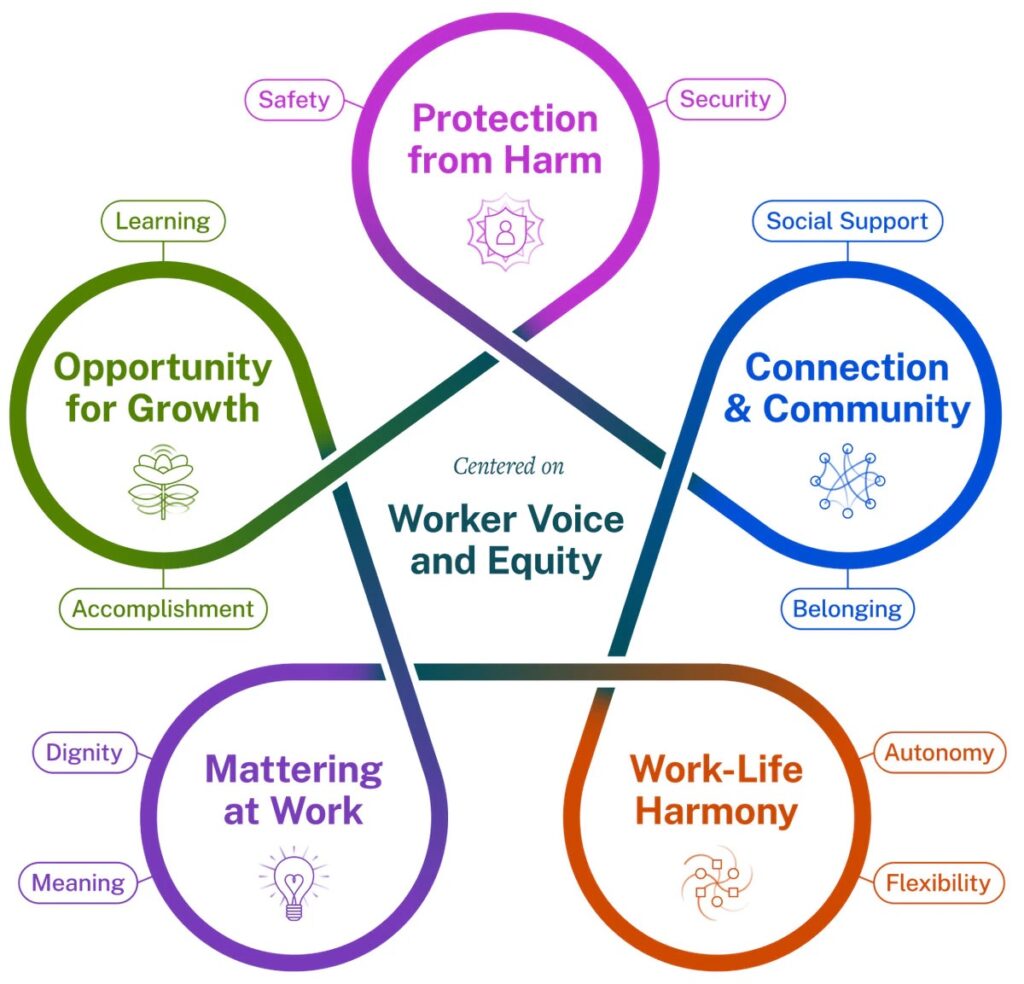The U.S. Surgeon General recently conducted an extensive investigation into workplace mental health and wellbeing.1 The report from the investigation makes clear what we’ve known, intrinsically – that our life at work matters and implicates our overall mental health and wellbeing.
At the time of the investigation, workplace thriving was at a low point. In one survey, “Nearly 80% of workers surveyed report that their workplace stress affects their relationships with friends, family, and coworkers.”2 In another, “76% of respondents reported at least one symptom of a mental health condition. Furthermore, 84% of respondents reported at least one workplace factor that had a negative impact on their mental health.”3
Don’t want to be one of these statistics?
The report also revealed the five essential components for thriving at work. As you contemplate your own career advancement – whether you want to grow in your current organization, to negotiate a promotion, or make a career change – consider including these as criteria for your next role.
No. 1: Growth
One of the most common reasons for a career transition? Feeling stuck, stagnant, and without opportunities for advancement. As you design the next chapter of your career, consider what this next step will mean for your professional growth. Is there a clear path for advancement, or is this the terminal role? Are you interested in the subject matter and feel encouraged to grow your expertise? Is there an existing process to receive regular, constructive feedback?
No. 2: Protection From Harm
Protection from harm requires that we feel safe at work and we feel confident that our job is secure. What to watch out for in your next role? An healthful environment free from “occupational hazards and physical workplace violence, as well as psychological harm such as bias, discrimination, emotional hostility, bullying, and harassment.” With regards to security, it’ll be helpful to know how much turnover there has been in the position. It’s also important to understand whether the industry is growing or shrinking, which can help you predict fluctuations in the demand for your role. Of course, company size and reputation are relevant, perhaps opting for a well-established, well-funded organization.
No. 3: Connection and Community
Whether you’re an introvert or extrovert, we all benefit from social support and sense of belonging at work. “Having social support, or relationships and networks that can offer physical and psychological help, such as emotional support, informational support, and advice, can mitigate feelings of loneliness and isolation. Belonging is the feeling of being an accepted member of a group, or of connectedness given one’s interpersonal relationships.” If workplace community has felt like a luxury, perhaps it’s time to prioritize it like a necessity.
No. 4: Work-Life Harmony
To experience work-life harmony, you need autonomy and flexibility at work. Put simply, you need the ability to choose when, where, and how you complete your work. How can you know if such harmony will exist in your next workplace? You can ask early on in the interview process: “How would you describe your ideal employee?” – this can give you clues as to what the employer expects regarding your availability. Later, when you have a job offer in hand, you can ask a more direct question: “In what ways do you empower your employees to choose when, where, and how they get their work done?”
No. 5: Mattering
We need to feel like we matter. According to the Surgeon General, “Mattering rests on the human needs of dignity and meaning. Dignity is the sense of being respected and valued. When the dignity of workers is affirmed and supported in the workplace, it enhances well‑being. Conversely, being made to feel disrespected or not valued may lead to an increase in stress and feelings of anger, cynicism, hostility, and withdrawal. Meaning in the workplace can refer to the sense of broader purpose and significance of one’s work.” What are the criteria to seek out in your next role? A fair, living wage, a voice and opportunities to engage in workplace decisions, a culture of gratitude and recognition, and a clear relationship between your work and something greater.

Not Thriving At Work?
I hope the above provided validation that your life at work implicates your overall wellbeing. And, if you’re not thriving at work, I hope you’ve gained a framework to both understand what’s missing and to define what you’ll seek out in your next position.
Want support making a career change? Check out my comprehensive course, For Hire.
- Addressing Health Worker Burnout: The U.S. Surgeon General’s Advisory on Building a Thriving Health Workforce, released in May 2022 from: https://www.hhs.gov/surgeongeneral/priorities/workplace-well-being/index.html ↩︎
- Mental Health America. (2022). Mind the workplace survey. Retrieved from: https://www.mhanational.org/mind-workplace ↩︎
- Mind Share Partners. (2021). 2021 Mental health at work report https://www.mindsharepartners.org/mentalhealthatworkreport-2021 ↩︎



Comments +